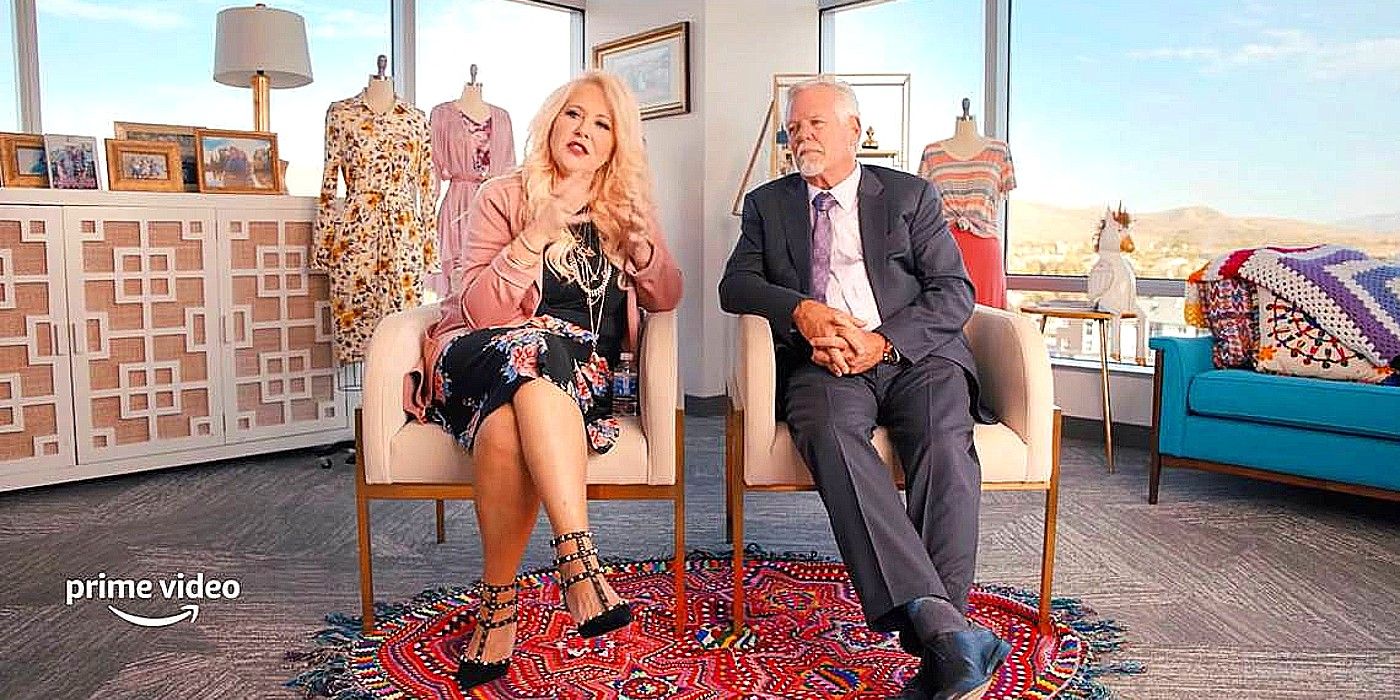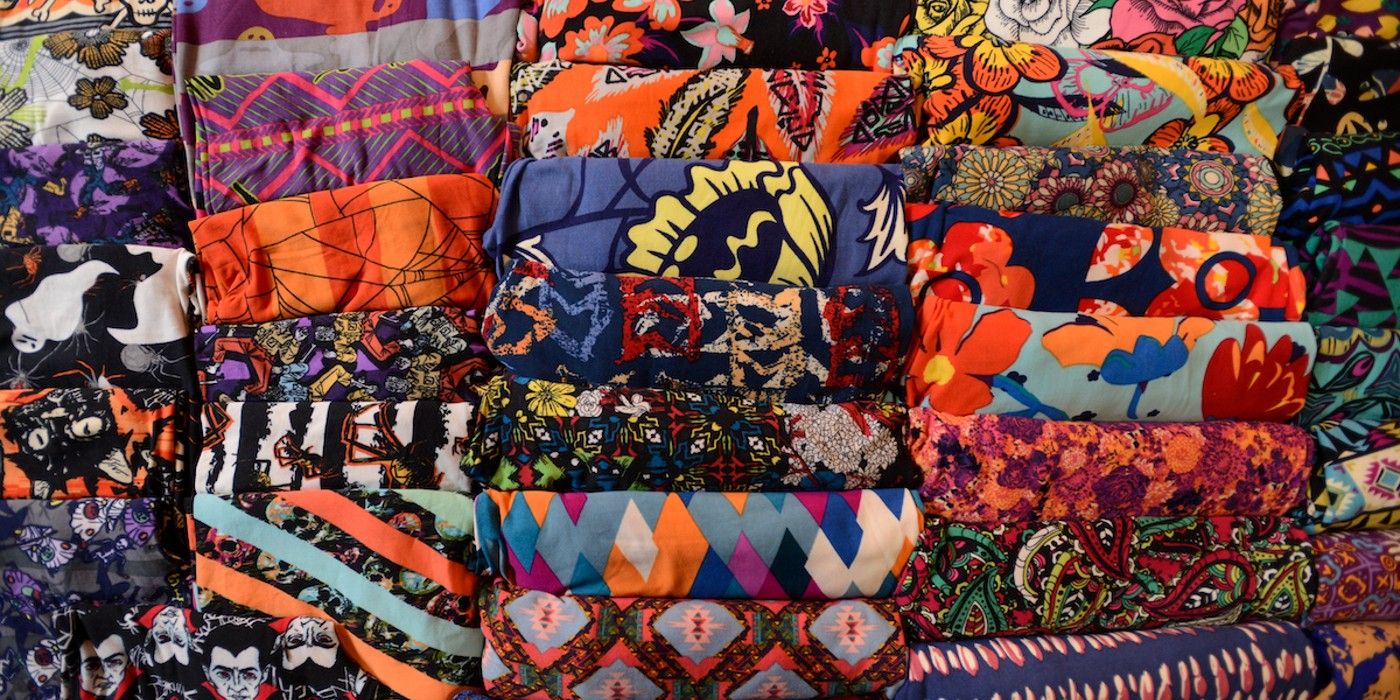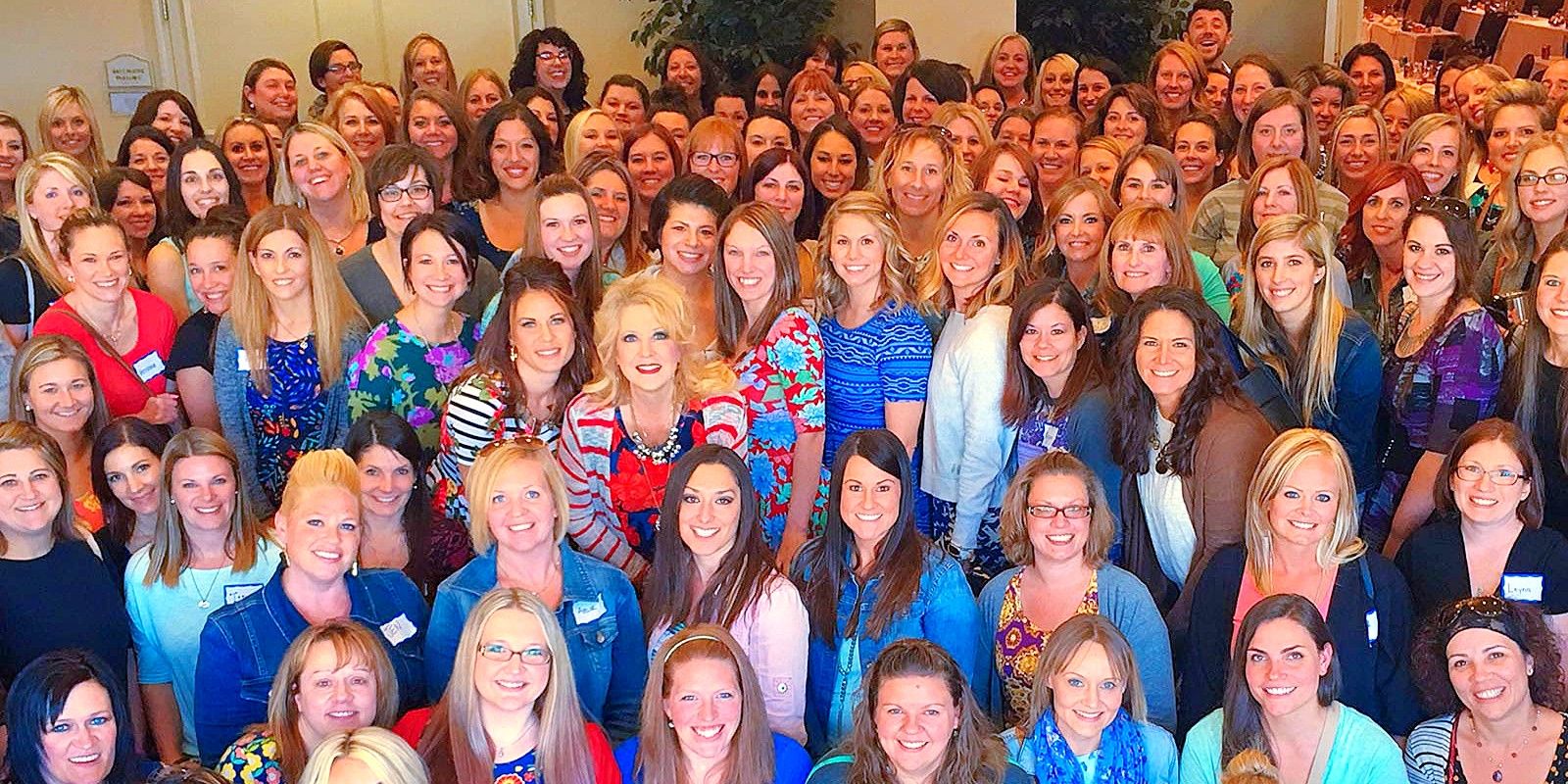
The Amazon Prime docuseries LuLaRich delves into why LuLaRoe — and other MLMs like it — are so insidiously dangerous. The exposé-style documentary TV series reveals the injustice of this industry; it features interviews with LuLaRoe founders, DeAnne Brady and Mark Stidham, as well as both current and former LuLaRoe consultants to look at the inner workings of the fashion phenomenon. Known for selling buttery soft leggings in wildly colorful patterns, LuLaRoe became an MLM sensation seemingly overnight — but behind the curtain, things weren't quite what they seemed.
MLMs, or multilevel marketing companies, are businesses that rely on the work of non-salaried consultants to derive a profit. Often referred to as "network marketing" or "pyramid selling," MLMs rely heavily on their consultants recruiting new consultants underneath them to make money, creating a pyramid-shaped hierarchy where those higher up on the pyramid profit off of the commissions earned by those beneath them. MLM companies span almost every industry; ItWorks and Younique in the makeup industry, Herbalife, Monat, and Young Living in health and wellness, LuLaRoe in the fashion industry, and hundreds more.
LuLaRich shows the many ways that LuLaRoe uses predatory and unethical business practices to exploit its consultants; however, it's only one of many MLMs that does so. While MLMs are a rapidly growing business, they're also controversial. As the Amazon Prime documentary reveals, these companies are often compared to pyramid schemes; companies like Herbalife, Younique, and LuLaRoe have all been charged as pyramid schemes by the FTC. MLMs sell the idea of being "entrepreneurs" and "owning your own business," though consultants aren't really business owners; they're retailers and independent contractors at best. Still, millions have signed on to become MLM consultants. Here's why LuLaRoe — and all MLM obsessions — are dangerous for everyone involved.

MLMs disproportionately target the most financially (and in some ways, emotionally) vulnerable. Stay-at-home moms, single mothers, military spouses, and those with disabilities are just some of the target demographics for MLMs. The companies will promise additional income for their families, flexible schedules to spend time with their children, and the ability to earn a full-time salary without stepping outside of their house; all promises that seem too good to be true. With misleading income statements and an army of #BossBabes all over social media, becoming an MLM consultant seems like the perfect opportunity for those who can't commit to the 9-to-5. They also promise a strong sense of community — something that seems incredibly alluring to the vulnerable demographics that MLMs target.
MLMs don't just target vulnerable people to become consultants; they also prey on vulnerable customers. Many MLMs revolve around the health and wellness industry, including Herbalife, Young Living, and Black Oxygen Organics (BOO). Their products are not FDA regulated, and many are currently battling lawsuits due to false claims and negative side effects. These companies make wildly unverified health claims, promising cures for anything from COVID-19 to cancer. Herbalife has been under fire for making false health claims and causing health issues, like liver damage, since the 1980s; Monat has been charged with causing hair loss with unsafe hair care products, and Young Living has received warnings from the FDA because distributors claimed their essential oils could cure the Ebola virus. With no proof behind any of these claims, MLMs take money from those who are desperate for a cure in exchange for snake oil.

A LuLaRich shows, MLMs are frequently faced with the accusation of being pyramid schemes. Pyramid schemes are scams with a hierarchal setup that relies on participants recruiting new members that are needed for the business to be profitable. This model highly favors those on top while guaranteeing those at the bottom will see little to no profit. A common defense from MLM companies against these accusations is that they cannot be a pyramid scheme because they offer a product; however, a closer look at the business structure of MLMs reveals that the profit doesn't come from selling the product, but rather, through the recruitment process. The Amazon Prime show LuLaRich revealed the exorbitant amount that new LuLaRoe consultants are required to pay to buy in; anywhere from $5000 to $10,000. LuLaRoe, at its highest point, had over 77,000 consultants — at a minimum $5000 buy-in, LuLaRoe brought in $385M in entrance fees alone.
Consultants are highly encouraged to recruit more and more consultants below them; this is referred to as a "downline." Consultants at the higher end of the pyramid — referred to as the "upline" — earn bonuses and commissions based on the number of people they're able to recruit underneath them. The true profits in an MLM model come from having a large downline and making it to the top of the pyramid. This, of course, is a goal that is only obtainable by very few, and usually, only those that get into the business early on. Looking at the LuLaRoe 2020 income disclosure statement, the pyramid structure is clear. While MLMs frequently tout that a job as a consultant can replace your day job, only 15.7% of LuLaRoe retailers made more than $15,000 in 2020; roughly 50% made less than $5000 for the whole year. In 2019, the Washington State Attorney General's Office filed a lawsuit against LuLaRoe. According to the Amazon series, its misleading statements regarding income and focus on recruitment landed the MLM in pyramid scheme territory. In February 2021, LuLaRoe paid $4.74M to resolve the lawsuit. Those at the top make money off the backs of those in their downline, sometimes bringing in up to six figures in downline commissions alone.

MLMS are designed so that those at the bottom are doomed to fail. The pyramid structure means that most involved don't have any kind of a downline to profit from, forcing them to rely solely on the profit that comes with selling merchandise. According to a 2017 report by the Consumer Awareness Institute, 99% of sellers in MLMs lose money. LuLaRoe's 2020 income statement reported that 18.6% of their sellers lost money; many of whom, according to LuLaRich, lose money due to defective products or being pressured to purchase more merch than they could sell. When consultants make a profit, they're encouraged to sink it back into their "business," buying new merch, investing in workshops to become better retailers (which are often held by the MLM themselves), and other business ventures. In the end, most consultants are left with nothing. MLM leaders urge their members to open credit cards and go into debt for their "business" while they live the life of luxury off of their downline's hard work.

When MLMs sell their consultant positions, one of the biggest allures is the idea of community. LuLaRoe promoted the image of "boss babes" living their best lives, working together in a network of sisterhood. The third episode of the Amazon TV series highlights the connection between MLMs and cults. They attend conventions in the thousands, book performances with stars like Katy Perry, and plaster social media with group vacations and cruises. Their consultants are always dressed to the nines — usually, in the company's products — live in beautiful homes, and drive the newest cars. The image these companies push online is golden: who wouldn't want to join a company like that? Underneath, however, is an entirely different story. MLM culture frequently aims to alienate their consultants until they rely completely on their company — both financially and socially — while deifying their founders and blaming consultants for their own "failures." Many MLMs have a culture that is heavily inspired by cults; consultants become completely indoctrinated into the company. They're encouraged to look the same, to dress the same, and to push the same copy-pasted rhetoric to their friends and families as the next consultant.
The aggressive style of direct MLM selling has cost many consultants their relationships with friends and families as many grow tired of being spoon-fed sales pitches in their DMs. The companies tell their consultants to "ignore the haters" when their loved ones express concern or disapproval for their participation in the company. LuLaRoe consultants were even pressured to get their husbands involved so that entire families fully relied on the company; in LuLaRich, former LuLaRoe consultant Roberta Blevins admits she was told she should "find a new husband" because hers didn't want to sell LuLaRoe. MLMs do everything they can to isolate their consultants in order to keep them devoted — just like cults. Members who choose to leave are ostracized, and current consultants are told to pretend they no longer exist. Many also share religious rhetoric — typically Mormon, in the case of LuLaRoe — and the founders of MLMs are treated like religious icons or cult leaders. Gaslighting and guilt are common tactics of MLM founders. In LuLaRich, many former consultants shared that they were told their failure was their own fault; if you failed, it was because you didn't try hard enough, or work long enough hours, or want it badly enough. All of these factors combined create the perfect storm of an exploitive, and dangerous, cult culture.
from ScreenRant - Feed https://ift.tt/3zlRMHn

0 Comments